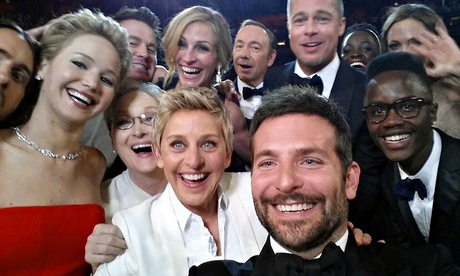
What do Kanye West, Kim Kardashian, and Justin Bieber have in common? Grandiose exhibitionism, inflated self-views, superficial personalities and shameless self-promotion. In that sense, they are just like millions of their Facebook and Twitter fans around the world, except successful.
Welcome to the age of digital narcissism, a world of endless ostentation opportunities and unlimited bragging possibilities. Showing-off has never been easier and, ironically, more celebrated.
Until the 90s, the media provided an escape from reality by transporting consumers to the fictional universe of sitcoms, soap operas and series. Then came reality TV, which turned our attention back to ourselves by broadcasting the allegedly genuine and ultra-mundane lives of everyday people, upgrading trash TV to a cultural blockbuster: couch potatoes watching couch potatoes. In the past decade, social media has taken us to unchartered territories of egotistic adulation by enabling everybody to broadcast their life and be the star of their own 24/7 hour show: consumers became actors and consumable products at once.
It is noteworthy that digital exhibitionism and inappropriate self-disclosure have been at the core of every mega-successful app and website. It all begun with MySpace, a directory for wannabe pop stars and DJ's. Then came Facebook, the encyclopaedia of common people. YouTube gave everybody their own TV channel, Blogger and Tumblr made us all creative writers. Twitter brought in tons of followers and LinkedIn positive endorsements – because who cares about our faults? Instagram made selfie the word of the year, while Tinder – the ultimate dating tool for narcissists – and Snapchat – the bastion of ephemeral sexting – make Facebook look intellectual. And if your concern is to remain connected after death, there is a whole movement, the digital afterlife industry, dedicated to the preservation of your narcissistic social media activity after you die. As Liveson's slogan puts it, "when your heart stops beating, just keep tweeting".
Unsurprisingly, narcissism levels have been rising for decades. Such increases pre-date social media but they have clearly exacerbated since its emergence. At the same time, there has been a steep decline in altruism and empathy levels since the advent of Facebook and Twitter. We are now more connected than ever, but also less interested in other people, except when it comes to finding out what they think about us. It is as if being closer to others made us more antisocial. Freud, who would no doubt have thousands of Twitter followers today (if he could sum-up his views in 140-characters), referred to this as the "hedgehog dilemma". That is, humans are like hedgehogs in the winter: they need to get close to each other to cope with the cold, but they cannot get too close without hurting each other with their spines.
Needless to say, most social media users are not narcissistic. Yet, social media is to narcissists what crack is to crack addicts: the more narcissistic you are, the heavier your social media use is. Indeed, scientific studies have shown that the number of status updates, attractive selfies, check-ins, followers and friends, are all positively correlated with narcissism, as is the tendency to accept invites from strangers, particularly when they are attractive. The reason for these correlations is that narcissistic individuals are much more likely to use social media to portray a desirable, albeit unrealistic, self-image, accumulate virtual friends and broadcast their life to an audience. Klout is a better measure of narcissism than of social reach.
Sure, there's nothing wrong with seeking others' approval – a healthy identity actually depends on paying careful attention to what others think of us. Furthermore, the need to be appreciated is a cornerstone of both psychological wellbeing and living in civilisation. When taken too far, however, the desire to be accepted morphs into a relentless quest for status, which undermines other people and impairs our ability to build and maintain happy relationships and successful careers.
The big problem with the rise of digital narcissism is that it puts enormous pressure on people to achieve unfeasible goals, without making them hungrier. Wanting to be Beyoncé or Jay Z is hard enough already, but when you are not prepared to work hard to achieve it, you are better off just lowering your aspirations. Few things are more self-destructive than a combination of high entitlement and a lazy work ethic. Ultimately, online manifestations of narcissism may be little more than a self-presentational strategy to compensate for a low and fragile self-esteem. Yet when these efforts are reinforced and rewarded by others, they perpetuate the distortion of reality and consolidate narcissistic delusions.
Perhaps it is time to turn social media into a therapeutic tool, at the service of the public and society. Online behavioural analysis is important not just to personalise media content and serve more relevant ads, but also to educate consumers. What better way to achieve this than to provide accurate feedback on their mental well-being?
We have already seen impressive examples for the social utility of big data, from predicting flue epidemics to diagnosing cancer. But how about examining the rise of narcissism? This could be done both at an individual and population level. Algorithms could be built into Facebook, Twitter and Instagram to alert users about their growing grandiosity, excessive self-promotion, pathological self-love and even signal when an entire population might be at risk of becoming too self-obsessed for its own sake. Or is it too late?
Tomas Chamorro-Premuzic is a professor of business psychology at University College London and vice-president of research and innovation at Hogan Assessment Systems. He is co-founder of metaprofiling.com and author of Confidence: Overcoming Low Self-Esteem, Insecurity, and Self-Doubt.
Get more articles like this sent direct to your inbox by signing up for free membership to the Guardian Media Network – brought to you by Guardian Labs.

